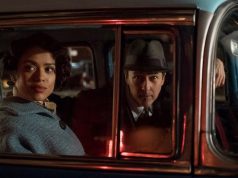Knowing that “Into the Wild” was written and directed by Sean Penn and features songs by Eddie Vedder, you’d expect it to be the most self-serious film ever made, full of lectures and humorless scolding. And there is some of that. The film is certainly the brooding, contemplative type. But it’s also at times surprisingly emotional and unguarded, with a central performance that could be one of the year’s best.
Based on Jon Krakauer’s book, it’s the true story of Christopher McCandless, a privileged Virginia kid who at age 22 left his family and friends and set out on a two-year trek West, wandering from place to place before ending up in Alaska. He made reckless and foolhardy decisions and has become for today’s disaffected youth either a folk hero or a cautionary tale, depending on your perspective.
Penn seems to view McCandless as a tragic figure, and his film mixes the beautiful with the devastating. Nature is majestic, and communing with it can be rejuvenating; on the other hand, to be alone in the world is a terrible thing.
We meet McCandless, played by 22-year-old Emile Hirsch, as he graduates from Emory University in 1990. His parents, wealthy social climbers played by William Hurt and Marcia Gay Harden, want to buy him a new car as a present and an incentive to go to grad school. It’s implied that they’re also a little embarrassed by the clunker he drives now.
Christopher couldn’t care less. He hates the way his parents raised him, constantly bickering and abusive to one another but always prepared with a façade in public. His rejection of them and his love of Thoreau, Jack London, and other naturalists has tainted him. He wants to leave society entirely — not just the material trappings of it, but all of it — and commune with the rivers and forests.
He heads West without telling anyone, not even his beloved younger sister, Carine (Jena Malone), and the film cuts between two timelines. One follows him on his journey, kayaking down the Colorado River, meeting hippies and foreigners, working with a wheat harvester in South Dakota, all with the goal of reaching Alaska. The other is two years later, when he has arrived in Alaska and is living in an old bus he’s found in the woods. He’s reached his destination. Let the enlightenment and oneness with the universe commence!
Of course there’s more to inner peace than that, which Christopher — who renames himself Alexander Supertramp on his journey — learns the hard way, crushingly, heartbreakingly. Hirsch’s commitment to the role is impressive, both physically (he lost 45 pounds to play Christopher at his most emaciated) and emotionally. In his performance we see the anger Christopher feels toward his parents, which has led to a disillusionment with society in general — and yet he remains a stalwartly good and decent person himself, more disappointed than cynical. He’s enthusiastic and driven. He has an unshakable moral code, and its his parents’ failure to live up to it that has turned him off.
Penn’s treatment of all this is ambitious and respectable, but also overlong and occasionally overripe. He takes a lyrical, poetic approach that serves the film well from a visual standpoint, not quite as well when it comes to the dialogue. Carine’s periodic voice-over narration, presumably from her diary, leads to howlers like this: “The weight of Chris’ disappearance had begun to lay down on me full-length.”
But the performances are fantastic, starting with Hirsch’s mature portrayal of the immature Christopher. Vince Vaughn has a nice semi-serious turn as a grain harvester who gives Chris a job; also of note are Catherine Keener and Brian Dierker as Jan and Rainey, a hippie couple that Christopher runs into a couple times on his trek. They become replacement parents to him, in a way, and Jan has a conversation with Christopher late in the film that reminds him of the pain his real parents must be feeling after all these months of not knowing where he is.
Most significant, however, is Ron Franz, an old man Christopher meets in the California desert. He’s played by Hal Holbrook in a performance that gives the film the emotional weight it needs to finally come together as it heads into its final act. Ron has plenty of sage advice to give, but he’s more than just a serene Morgan Freeman-style Wise Old Man. Ron can see that a kid as idealistic, naive, and unprepared as Christopher isn’t going to make it in the harsh world without help, and he’s visibly saddened by this knowledge, practically pleading with Christopher to forgive his parents and return to real life. Holbrook’s work is a true embodiment of a great supporting performance.
Christopher resists the attempts of Ron, Jan, and others to love him, having stubbornly determined that such concerns are irrelevant to him. It’s not until it’s too late that he recognizes what they were subtly teaching him all along: that communing with nature can bring tranquility and joy, but it’s ultimately nothing if you don’t have someone to share it with.
B (2 hrs., 30 min.; )





